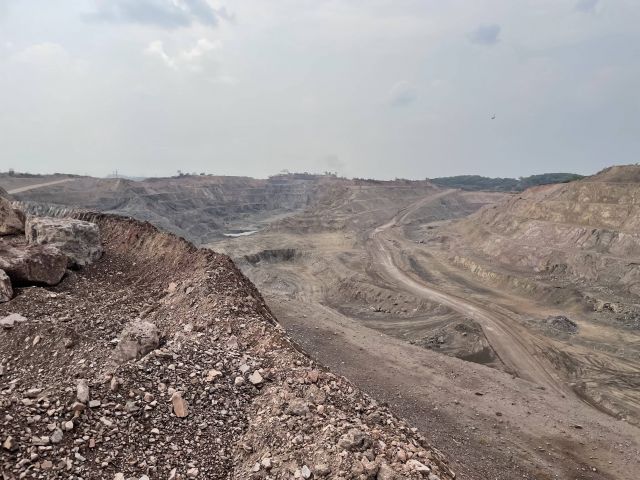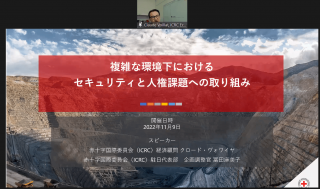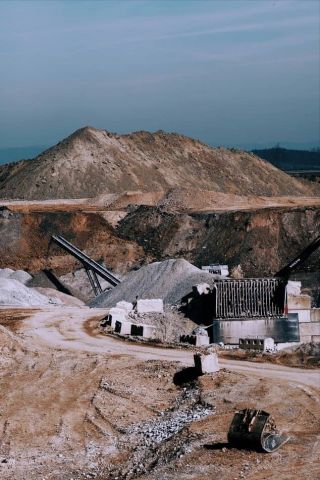Training for Tenke Fungurume Mining (TFM) on the Voluntary Principles

In November 2022, DCAF and its Congolese NGO partner Justicia delivered a training on the Voluntary Principles on Security and Human Rights (VPs) to Tenke Fungurume Mining (TFM) – one of the largest cobalt and copper mines in the world and an affiliate of Chinese mining group CMOC. The three-day training targeted not only TFM’s security department and agents, but all relevant corporate departments, the management, and concluded with meetings between company representatives and community members as well as artisanal miners.
This pilot training was part of a concerted effort to use the VPs framework and its multi-stakeholder approach to address long-standing challenges in the Katanga extractive sector. Justicia has served since 2018 as the Secretariat of VPs Working Groups in the cobalt and copper rich Haut-Katanga and Lualaba provinces to promote dialogue between provincial government officials, companies, and civil society and community representatives.
The TFM concession spans over 1600 square kilometres and faces the reality of large-scale local communities living side by side with mining operations. This context presents numerous safety challenges both for staff and the local population. The security and human rights situation is complex with the presence of multiple actors such as security personnel, mining police (PMH) and national army deployed in Katanga. To address these ongoing challenges, TFM approached the local VPs Working Group and DCAF with the objective to further mainstream VPs norms and good security practices across the company and its stakeholders. In addition, the VPs, that the company recognizes, are a key framework to uphold its global reputation and social license to operate. The importance of the framework is also recognized by the DRC government, who has applied to formally become a member of the initiative this year.
From 1-4 November, Justicia and DCAF delivered training sessions to TFM and CMOC Group management. The participants also included trainers from TFM and the new mining site CMOC Kisanfu Mining. The full range of security actors were present in the main training with members of private security companies, police, and military. In total, more than 80 participants attended the different events delivered jointly by Justicia and DCAF, with additional interventions from a high-ranked police officer from Lubumbashi who acts as a local VP champion.
The management session included a keynote presentation by Mr. Sun Lihui, director of Chinese extractive industry association CCCMC, and an introduction by Fang Cheng from ICRC Beijing. DCAF, the ICRC, and CCCMC collaborate to increase the knowledge of business and human rights for Chinese companies, and DCAF and ICRC have been adapting the newly-updated Toolkit on Addressing Security and Human Rights Challenges to Chinese companies.
In a spirit of peer-learning, the main training featured guests from VPs member company MMG who shared their successes in hiring security agents from surrounding communities, a practice that has improved community relations at their concession at Kinsevere. Their presentation initiated an offer by TFM to organize further visits and exchange of good practices.
The activities concluded with a meeting of TFM company representatives with community members regarding artisanal mining and risk reduction. That meeting was organized by Justicia. Artisanal mining on the TFM site is illegal but widespread due to a lack of economic alternative. The training and the direct discussions contributed to a reflection on the need to redefine relationships between industrial and artisanal miners and a broader recognition that artisanal miners should be taken into account as stakeholders.
The week of activities concluded with TFM reaffirming its commitment to engage with Justicia and the VPs Working Group. The CMOC Group has also indicated that its new copper-cobalt mining venture KFM will begin to participate in the VPs Working Group.
Beyond this pilot training, the potential to develop the VPs to address common challenges in the region relies on dialogue between peers, government and community representatives. DCAF and Justicia are looking forward to further engagement with companies through the VP Working Groups to promote security and human rights in the DRC extractives sector.




